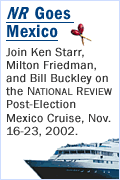 |
| |
|
October 11, 2002, 9:00
a.m. By Jay Nordlinger, NR Managing Editor EDITOR'S NOTE: Former president Jimmy Carter was awarded the Nobel Peace Prize on October 11, 2002. In the May 20, 2002, issue of National Review, and in an online column around the same time, Jay Nordlinger provided an alternative read on the Carter presidency, and post-presidency. For the print magazine piece click here. The NRO column is reprinted below. |
![]() ll right, I’ve got Carter on
my mind, so look out. Why Carter? Didn’t he leave office in 1981 (the same
day the mullahs decided to spring the hostages, lest RR send a few up
their gazoo)? Yes, but he’s back in the news, yapping absurdly about the
Middle East and getting ready to visit Castro down in Cuba (May 12 to May
17).
ll right, I’ve got Carter on
my mind, so look out. Why Carter? Didn’t he leave office in 1981 (the same
day the mullahs decided to spring the hostages, lest RR send a few up
their gazoo)? Yes, but he’s back in the news, yapping absurdly about the
Middle East and getting ready to visit Castro down in Cuba (May 12 to May
17).
|
|
|
For several days, I rooted around in all things Carter, preparing for a piece that appears in the new NR (“There He Goes Again: Jimmy Carter, Our ‘Model Ex-President’”). I’m not done with our 39th prez — not nearly done — and I wanted to share some things with Impromptus-ites that I couldn’t quite get off my chest in the magazine. Up for a kind of Carterpalooza? I didn’t think so, but try a little of it anyway. The below items will be more or less at random, although I’ll try to impose a speck of order on them. If you have forgotten about Carter, you will be reminded.
I, personally, have always been sort of fascinated by the man (and his family, and his home environs). I suppose I’ve read just about everything significant ever written about him. (Does anyone know what the phrase “Lordy, Lordy, Jim Jack Gordy” could possibly mean? If so, you are a fellow Carterologist.) I have followed Jimmy C. since the Democratic primaries of 1976. The other day, in conversation with someone, I described his chronicler Douglas Brinkley as “a great admirer of Carter who’s not blind to his faults.” I suppose I’d describe myself as a great critic of Carter’s who’s not blind to his virtues.
Anyway, let’s Carter away.
![]() For years, Carter has been a
thorn in the side of presidents, acting as a kind of “anti-president,” as
Lance Morrow once put it in an essay for Time. You recall how
Carter irked Clinton on Haiti and North Korea. His low moment, however,
came during the run-up to the Gulf War, when he wrote members of the U.N.
Security Council — including Mitterrand’s France and Communist China —
urging them to thwart the Bush administration’s effort. Our government
found out about it when the Canadian prime minister, Brian Mulroney,
called the defense secretary, Dick Cheney, and said, “What the . . .?”
Some people actually allowed themselves to utter the word
“treason.”
For years, Carter has been a
thorn in the side of presidents, acting as a kind of “anti-president,” as
Lance Morrow once put it in an essay for Time. You recall how
Carter irked Clinton on Haiti and North Korea. His low moment, however,
came during the run-up to the Gulf War, when he wrote members of the U.N.
Security Council — including Mitterrand’s France and Communist China —
urging them to thwart the Bush administration’s effort. Our government
found out about it when the Canadian prime minister, Brian Mulroney,
called the defense secretary, Dick Cheney, and said, “What the . . .?”
Some people actually allowed themselves to utter the word
“treason.”
![]() Sometimes, Carter says he
would never act at odds with the government; at other times, he talks
about a higher law, a duty to conscience, etc. Either would be fine: but
the ex-president doesn’t stick to one or the other.
Sometimes, Carter says he
would never act at odds with the government; at other times, he talks
about a higher law, a duty to conscience, etc. Either would be fine: but
the ex-president doesn’t stick to one or the other.
![]() Carter has long enjoyed a
reputation as a Middle East sage, owing, of course, to his role in the
original Camp David accords. That reputation, however, rests on shaky
grounds. Truth is, Sadat and Begin had their deal worked out before ever
approaching Washington. And the facilitators they used were far from
saintly Southern Baptists: They used the dreadful King of Morocco and the
even more dreadful Ceausescu of Romania! When they had their plan
essentially worked out, however, they called the White House (whose
occupant just happened to be J.C.) (initials not accidental, he and his
most fervent admirers have seemed to think for years).
Carter has long enjoyed a
reputation as a Middle East sage, owing, of course, to his role in the
original Camp David accords. That reputation, however, rests on shaky
grounds. Truth is, Sadat and Begin had their deal worked out before ever
approaching Washington. And the facilitators they used were far from
saintly Southern Baptists: They used the dreadful King of Morocco and the
even more dreadful Ceausescu of Romania! When they had their plan
essentially worked out, however, they called the White House (whose
occupant just happened to be J.C.) (initials not accidental, he and his
most fervent admirers have seemed to think for years).
Why did they contact the White House? Prof. Bernard Lewis put it succinctly to Charlie Rose recently: “Well, obviously, they needed someone to pay the bill, and who but the United States could fulfill that function?”
Still, Carter is proud-as-all-get-out of his rendezvous with Middle East history. He trades on it incessantly. I remember Mario Cuomo, giving his famous (though ridiculous) keynote address at the Democratic convention in 1984. He went down a list of Democratic presidents, lauding them: and when he got to Carter, all he could think of, apparently, was Camp David — the “nearly miraculous” accords, he called them. Carter, in the stands, beamed and beamed, and teared up badly.
![]() I don’t think I’ve ever known,
or known of, someone who so nakedly loved praise. I saw him on C-SPAN
once, appearing on a radio show (if you know what I mean). This was a
call-in show somewhere, and the cameras were on Carter. One elderly caller
began her question with a long paean to the ex-president and his special
human greatness. Carter enjoyed it in a truly unseemly fashion, grinning
and grinning, seeming to draw his very life from it. It was perfectly
human — perfectly natural — but obscene in a way. I felt almost as though
I had to look away: like I was seeing something too private, something I
wasn’t meant to see.
I don’t think I’ve ever known,
or known of, someone who so nakedly loved praise. I saw him on C-SPAN
once, appearing on a radio show (if you know what I mean). This was a
call-in show somewhere, and the cameras were on Carter. One elderly caller
began her question with a long paean to the ex-president and his special
human greatness. Carter enjoyed it in a truly unseemly fashion, grinning
and grinning, seeming to draw his very life from it. It was perfectly
human — perfectly natural — but obscene in a way. I felt almost as though
I had to look away: like I was seeing something too private, something I
wasn’t meant to see.
(As I re-read this — yes, I occasionally re-read these columns — I see that this particular item relates to my final one. No fair peeking!)
![]() The ex-president has always
considered himself screwed out of the Nobel prize, and he and his Carter
Center have campaigned rather embarrassingly openly for it. He has won
prizes, however, about which he crows: There was one named after his
fellow liberal southerner, Fulbright; there was one from the U.N. (natch);
and there was my favorite: the Zayed International Prize for the
Environment, named for His Highness Sheikh Zayed bin Sultan al-Nahyan of
the United Arab Emirates!
The ex-president has always
considered himself screwed out of the Nobel prize, and he and his Carter
Center have campaigned rather embarrassingly openly for it. He has won
prizes, however, about which he crows: There was one named after his
fellow liberal southerner, Fulbright; there was one from the U.N. (natch);
and there was my favorite: the Zayed International Prize for the
Environment, named for His Highness Sheikh Zayed bin Sultan al-Nahyan of
the United Arab Emirates!
Arabs are heavy-duty funders of the Carter Center, and they get a lot for their money.
![]() No one quite realizes just how
passionately anti-Israel Carter is. William Safire has reported that Cyrus
Vance acknowledged that, if he had had a second term, Carter would have
sold Israel down the river. In the 1990s, Carter became quite close to
Yasser Arafat. After the Gulf War, Saudi Arabia was mad at Arafat, because
the PLO chief had sided with Saddam Hussein. So Arafat asked Carter to fly
to Riyadh to smooth things over with the princes and restore Saudi funding
to him — which Carter did.
No one quite realizes just how
passionately anti-Israel Carter is. William Safire has reported that Cyrus
Vance acknowledged that, if he had had a second term, Carter would have
sold Israel down the river. In the 1990s, Carter became quite close to
Yasser Arafat. After the Gulf War, Saudi Arabia was mad at Arafat, because
the PLO chief had sided with Saddam Hussein. So Arafat asked Carter to fly
to Riyadh to smooth things over with the princes and restore Saudi funding
to him — which Carter did.
![]() You who read Impromptus have
heard me say: When I was growing up, I perceived the Arab-Israeli conflict
as a great civil-rights drama. The white oppressors were the Israelis, and
the black sufferers and innocents were the Arabs, in particular the
Palestinians. Menachem Begin, I thought, was George C. Wallace, and his
defense minister, Ariel Sharon, was Bull Connor. (This was in the early
’80s.)
You who read Impromptus have
heard me say: When I was growing up, I perceived the Arab-Israeli conflict
as a great civil-rights drama. The white oppressors were the Israelis, and
the black sufferers and innocents were the Arabs, in particular the
Palestinians. Menachem Begin, I thought, was George C. Wallace, and his
defense minister, Ariel Sharon, was Bull Connor. (This was in the early
’80s.)
Well, blow me down. I had never heard anybody else — a soul — say anything like this. But here is Carter, to Douglas Brinkley, Carter’s biographer and analyst: “The intifada exposed the injustice Palestinians suffered, just like Bull Connor’s mad dogs in Birmingham.”
The Carter-Nordlinger axis rides again (but, hang on, I’ve changed my mind — had “an evolution of thought,” as we say).
![]() In The Unfinished
Presidency, Brinkley writes, “There was no world leader Jimmy Carter
was more eager to know than Yasir Arafat.” The former president “felt
certain affinities with the Palestinian: a tendency toward hyperactivity
and a workaholic disposition with unremitting sixteen-hour days, seven
days a week, decade after decade.” Neat, huh?
In The Unfinished
Presidency, Brinkley writes, “There was no world leader Jimmy Carter
was more eager to know than Yasir Arafat.” The former president “felt
certain affinities with the Palestinian: a tendency toward hyperactivity
and a workaholic disposition with unremitting sixteen-hour days, seven
days a week, decade after decade.” Neat, huh?
At their first meeting — in 1990 — Carter boasted of his toughness toward Israel, assuring Arafat at one point, “. . . you should not be concerned that I am biased. I am much more harsh with the Israelis.” Arafat, for his part, railed against the Reagan administration and its alleged “betrayals.” Rosalynn Carter, taking notes for her husband, interjected, “You don’t have to convince us!” Brinkley records that this “elicited gales of laughter all round.” Carter himself, according to Brinkley, “agreed that the Reagan administration was not renowned as promise keepers” (this, to Arafat).
If you are sickened by the thought of a former U.S. president and a former First Lady of the United States and the career terrorist Yasser Arafat all sitting around bashing Ronald Reagan . . . you and I think alike.
![]() Mary King was Carter’s key
aide and emissary. She once took a flight with Arafat, and “Arafat noticed
that I was tired and insisted that I take his customary seat on his plane
because it reclined in a certain way, so that I could sleep. I used my
handbag as a pillow. After some time had passed, I noticed that a pillow
was being ever so gently substituted for the handbag. Arafat himself was
trying to place the pillow under my head without waking me. This reflected
a caring side to his character which has rarely been evident to the
international public as a whole.”
Mary King was Carter’s key
aide and emissary. She once took a flight with Arafat, and “Arafat noticed
that I was tired and insisted that I take his customary seat on his plane
because it reclined in a certain way, so that I could sleep. I used my
handbag as a pillow. After some time had passed, I noticed that a pillow
was being ever so gently substituted for the handbag. Arafat himself was
trying to place the pillow under my head without waking me. This reflected
a caring side to his character which has rarely been evident to the
international public as a whole.”
Here, folks, we are in Amb. Joseph Davies territory. Remember him? “He gives the impression of a strong mind which is composed and wise. His brown eye is exceedingly kindly and gentle. A child would like to sit in his lap, and a dog would sidle up to him.” Davies spoke these words about Stalin.
![]() When Saddam Hussein invaded
and raped Kuwait, Mary King cabled her boss, Carter: “Saddam learned from
the Israelis that might makes right — they took most of Palestine by force
and 20 years later occupied the West Bank and Gaza.” That’s the Carter
mindset: no thought to the wars of attempted annihilation waged against
Israel, which made such occupation thinkable or necessary.
When Saddam Hussein invaded
and raped Kuwait, Mary King cabled her boss, Carter: “Saddam learned from
the Israelis that might makes right — they took most of Palestine by force
and 20 years later occupied the West Bank and Gaza.” That’s the Carter
mindset: no thought to the wars of attempted annihilation waged against
Israel, which made such occupation thinkable or necessary.
![]() After Carter had that first
meeting with Arafat, he went home and promptly served the PLO head as PR
adviser and speechwriter. What do I mean? Listen to Brinkley: “On May 24
Carter drafted on his home computer the strategy and wording for a generic
speech Arafat was to deliver soon for Western ears . . .” Said Carter,
“The audience is not the Security Council, but the world community. The
objective of the speech should be to secure maximum sympathy and support
of other world leaders . . . The Likud leaders are now on the defensive,
and must not be given any excuse for continuing their present abusive
policies.”
After Carter had that first
meeting with Arafat, he went home and promptly served the PLO head as PR
adviser and speechwriter. What do I mean? Listen to Brinkley: “On May 24
Carter drafted on his home computer the strategy and wording for a generic
speech Arafat was to deliver soon for Western ears . . .” Said Carter,
“The audience is not the Security Council, but the world community. The
objective of the speech should be to secure maximum sympathy and support
of other world leaders . . . The Likud leaders are now on the defensive,
and must not be given any excuse for continuing their present abusive
policies.”
Carter went on,
A good opening would be to outline the key points of the Save the Children report. . . . Then ask: “What would you do, if these were your children and grandchildren? As the Palestinian leader, I share the responsibility for them. Our response has been to urge peace talks, but the Israeli leaders have refused, and our children continue to suffer. Our people, who face Israeli bullets, have no weapons: only a few stones remaining when our homes are destroyed by the Israeli bulldozers.” . . . Then repeat: “What would you do, if these were your children and grandchildren?” . . . This exact litany should be repeated with a few other personal examples.
Things are a little clearer now.
![]() Carter’s op-ed piece for the New York Times last month —
April 21 — was a nasty piece of work, an apologia for Arafat (despite a
pro forma and unconvincing attempt at “balance”) and a mendacious attack
on Sharon and Israel.
Carter’s op-ed piece for the New York Times last month —
April 21 — was a nasty piece of work, an apologia for Arafat (despite a
pro forma and unconvincing attempt at “balance”) and a mendacious attack
on Sharon and Israel.
His hatred for Sharon is deep, obvious, and personal. At times he seems to use the man as a proxy for Israel: in other words, it’s okay openly to despise Sharon, if it’s slightly less okay openly to despise Israel. He refers to Sharon’s — Sharon’s — “invasion” of Egypt and his “invasion” of Lebanon. Of course, Meir was prime minister in the one instance, and Begin was prime minister in the other. Sharon was a general or defense minister. Carter also forgets the annoying little detail that Israel is a democracy, and that the people of that country democratically elected Sharon their prime minister. This is in sharp contrast to the Arab states, plus the P.A., that Carter admires and excuses.
Although he does view Arafat as a democratically elected leader: The 1996 elections in the P.A., he writes, were “democratic,” “open,” “fair,” and “well organized” (they were well organized, all right). Needless to say, those elections were like any other in the Arab world, which is to say, rigged from beginning to end. I hope you all enjoyed former CIA director Jim Woolsey’s quip to Joel Mowbray, writing on NRO last week: “Arafat was essentially ‘elected’ the same way Stalin was, but not nearly as democratically as Hitler, who at least had actual opponents.” Arafat’s “opponent” was a prop.
![]() I will tell you a couple of
curious things about Carter’s op-ed piece (which I address at slightly
more length in my National Review article). In the newspaper — the
actual, physical newspaper — a line came out, “the recent destruction in
Jenin and other towns of the West Bank.” But in the version of the piece
found on the Times’s website, that line reads: “the recent
destruction of Jenin and other villages.” Big difference. The latter line,
of course, merely repeats false PLO propaganda, as Carter is wont to do.
Hard evidence disproves the charge that Jenin was “destroyed.” In fact, a
tiny portion of it was wrecked, as the Israelis fight terrorists — who
insert themselves among civilians, who are in truth human shields —
punctiliously, compared with the battle tactics of the rest of the world
(and they suffer the added casualties that go with that, not that Carter
or his like care).
I will tell you a couple of
curious things about Carter’s op-ed piece (which I address at slightly
more length in my National Review article). In the newspaper — the
actual, physical newspaper — a line came out, “the recent destruction in
Jenin and other towns of the West Bank.” But in the version of the piece
found on the Times’s website, that line reads: “the recent
destruction of Jenin and other villages.” Big difference. The latter line,
of course, merely repeats false PLO propaganda, as Carter is wont to do.
Hard evidence disproves the charge that Jenin was “destroyed.” In fact, a
tiny portion of it was wrecked, as the Israelis fight terrorists — who
insert themselves among civilians, who are in truth human shields —
punctiliously, compared with the battle tactics of the rest of the world
(and they suffer the added casualties that go with that, not that Carter
or his like care).
![]() At the end of his piece,
Carter calls — no surprise — for an American crackdown on our ally,
Israel: Silence its weapons, threaten its aid. Carter then writes, “I
understand the extreme political sensitivity in America of using
persuasion on the Israelis” — which, to me, sounds an awful lot like,
“Sure, that blasted Jewish lobby controls U.S. policy, as it always has —
except maybe for the shining years of 1977 to 1981.”
At the end of his piece,
Carter calls — no surprise — for an American crackdown on our ally,
Israel: Silence its weapons, threaten its aid. Carter then writes, “I
understand the extreme political sensitivity in America of using
persuasion on the Israelis” — which, to me, sounds an awful lot like,
“Sure, that blasted Jewish lobby controls U.S. policy, as it always has —
except maybe for the shining years of 1977 to 1981.”
Really disgusting, this effort, and utterly revealing of Carter.
![]() The ex-president is known as
Joe Human Rights, but he’s mighty selective about whose human rights to
champion. If you live in Marcos’s Philippines, Pinochet’s Chile, or
apartheid South Africa, he’s liable to care about you. If you live in
Communist China, Communist Cuba, Communist Ethiopia, Communist Nicaragua,
Communist North Korea, Communist . . .: screw you.
The ex-president is known as
Joe Human Rights, but he’s mighty selective about whose human rights to
champion. If you live in Marcos’s Philippines, Pinochet’s Chile, or
apartheid South Africa, he’s liable to care about you. If you live in
Communist China, Communist Cuba, Communist Ethiopia, Communist Nicaragua,
Communist North Korea, Communist . . .: screw you.
Remember when the Left used to say, “Okay, maybe the West has ‘political rights,’ but the East has ‘social rights’”? Carter isn’t far off from that. A mission statement of his Center reads, “‘Human rights’ is a broad term, encompassing freedom from oppression and freedom of speech to the right to food and health.” This is on the way to Erich Honecker. And as Jeane Kirkpatrick — whom Carter also openly despises — points out, it’s amazing how those who lack the freedom of speech, the freedom of worship, the freedom of assembly, and so on, also tend to lack food, shelter, and health.
In a 1997 op-ed piece entitled “It’s Wrong to Demonize China” (also for the New York Times), Carter wrote — and forgive the awkward prose — “American criticism of China’s human rights abuses are justified, but their basis is not well understood. Westerners emphasize personal freedoms, while a stable government and a unified nation are paramount to the Chinese. This means that policies are shaped by fear of chaos from unrestrained dissidents or fear of China’s fragmentation by an independent Taiwan or Tibet. The result is excessive punishment [excessive punishment!] of outspoken dissidents and unwarranted domination of Tibetans.”
Carter said that “ill-informed commentators in both countries have cast the other side as a villain and have even forecast inevitable confrontation between the two nations.” You see the exquisite moral equivalence between a giant and repressive Communist state and the American republic. He then said, “Mutual criticisms are proper and necessary [mutual criticisms, mind you: Communist China, America . . .], but should not be offered in an arrogant or self-righteous way, and each of us should acknowledge improvements made by the other.” Carter arrogant or self-righteous, ever? Improvements made by the United States, too?
This is sick-making.
In the same piece, Carter came very close to claiming that freedom of religion had come to China — causing activists in the field, who know the wretched truth, to groan in pain.
In a 1999 op-ed piece (USA Today) called “Let’s Keep Chinese Spying in Perspective,” Carter said that “some . . . American leaders, who have habitually demonstrated animosity toward the People’s Republic of China [note the mimicking of the Communists’ own false description of themselves], have attempted to drive a deeper wedge between our two countries at what is already a troubled time.” Anyone who doesn’t demonstrate “animosity” toward that horrible state, Realpolitik or no, is no friend to mankind.
![]() A walk down Memory Lane? While
in office, Carter hailed Yugoslavia’s Tito as “a man who believes in human
rights.” He said of Romania’s barbaric Ceausescu and himself, “Our goals
are the same: to have a just system of economics and politics . . . We
believe in enhancing human rights.” While out of office, Carter has
praised Syria’s late Assad (killer of at least 20,000 in Hama) and the
Ethiopian tyrant Mengistu (killer of many more than that). In Haiti, he
told the dictator Cédras that he was “ashamed of what my country has done
to your country.”
A walk down Memory Lane? While
in office, Carter hailed Yugoslavia’s Tito as “a man who believes in human
rights.” He said of Romania’s barbaric Ceausescu and himself, “Our goals
are the same: to have a just system of economics and politics . . . We
believe in enhancing human rights.” While out of office, Carter has
praised Syria’s late Assad (killer of at least 20,000 in Hama) and the
Ethiopian tyrant Mengistu (killer of many more than that). In Haiti, he
told the dictator Cédras that he was “ashamed of what my country has done
to your country.”
He did even better in North Korea, singing praises to Kim Il Sung, one of the most complete and destructive dictators in history. Kim’s North Korea, as Kirkpatrick says, was, and is, truly a “psychotic state.” Said Carter of the “Great Leader,” “I find him to be vigorous, intelligent, surprisingly well informed about the technical issues, and in charge of the decisions about this country” (well, he was absolute ruler). He said, “I don’t see that they [the North Koreans] are an outlaw nation.” Pyongyang, he observed, was a “bustling city,” where shoppers “pack the department stores,” reminding him of the “Wal-Mart in Americus, Georgia.” Carter also employed his longstanding technique of praising the beauty of a dictator’s wife. Kim Jon Ae, he noted, “is a very attractive lady.”
(Joshua Muravchik reminded us of many of these nuggets in an excellent New Republic piece from 1994.)
Then there’s Carter’s notorious friendship with Daniel Ortega, former strongman in Nicaragua. In 1984, when the Reagan administration was trying to put maximum pressure on Ortega to submit to democracy, Carter urged Habitat for Humanity to build in Nicaragua. A fine idea, perhaps, but here’s the (classic) Carter twist: “We want the folks down there to know that some American Christians love them and that we don’t all hate them.” In 1990, of course, Carter traveled to Managua to monitor the elections and to certify what he figured — and hoped, it seemed — would be a Sandinista victory. When the democratic opposition won instead, Carter was remarkably churlish, even bitter. (Remember that fantastic P. J. O’Rourke piece for The American Spectator on all this?) As Kirkpatrick says, “You’d have thought a democrat would be happy.”
But Carter is not completely blinkered when it comes to brutal dictators. Here’s what he said to his interviewer and admirer James Zogby (one of America’s foremost PLO advocates) in 2001: “I think the sanctions are hurting the people of Iraq, and not Saddam Hussein, whom I consider to be a dictator, and I think an insensitive dictator [!], and he is able now to blame all of his maybe self-induced problems [“maybe self-induced”!], economically and socially, on the United States because of our sanctions and because of our fairly infrequent aerial attacks.”
Friends and foes can agree on one thing: There’s no one like Carter. No one.
![]() Jimmy C. thinks very, very
little of the current president of the United States. In an interview with
the Columbus Ledger-Enquirer last year, he said, “I don’t think
that George W. Bush has any particular commitment to preservation of the
principles of human rights.” SDI? “A ridiculous project technologically”
and “counter to control of nuclear weapons in the world” (huh?). Also, “it
will be a waste of money” and “it’s driven by pressures from manufacturers
of weapons and so forth, among others.” The Kyoto protocol? “I think we
should carry it out, fervently.”
Jimmy C. thinks very, very
little of the current president of the United States. In an interview with
the Columbus Ledger-Enquirer last year, he said, “I don’t think
that George W. Bush has any particular commitment to preservation of the
principles of human rights.” SDI? “A ridiculous project technologically”
and “counter to control of nuclear weapons in the world” (huh?). Also, “it
will be a waste of money” and “it’s driven by pressures from manufacturers
of weapons and so forth, among others.” The Kyoto protocol? “I think we
should carry it out, fervently.”
He is also on record as saying that to drill in ANWR would be to “destroy” it (ask Jonah Goldberg, pal).
And, of course, when Bush — leading
this nation into war, after a devastating attack — identified an “axis of evil,” Carter pronounced this “overly simplistic and counter-productive.” (Not infrequently does the ex-president sound like the French foreign minister.) He added, “I think it will take years before we can repair the damage done by that statement.”
![]() Want more Carter? Okay, but
I’m almost done. Here’s something personal — very — from Carter’s book
The Virtues of Aging:
Want more Carter? Okay, but
I’m almost done. Here’s something personal — very — from Carter’s book
The Virtues of Aging:
When I was married at the age of 22 and relishing an active sex life, I assumed that this was a pleasure that my middle-aged parents rarely, if ever, enjoyed. Now, well past 70, Rosalynn and I have learned to accommodate each other’s desires more accurately and generously, and have never had a more complete and enjoyable relationship.
Shudder, shudder, shudder, shudder, shudder, shudder, shudder.
![]() Folks, I’m sorry, I don’t
think I can go on. There’s your Carterpalooza. Hope you enjoyed it (or
whatever). Have a good weekend.
Folks, I’m sorry, I don’t
think I can go on. There’s your Carterpalooza. Hope you enjoyed it (or
whatever). Have a good weekend.
Schweizer: Troubling
Trophy 10/11 3:00 p.m.
![]()
![]()
![]()
![]()
WFB: While You
Were Out 10/11 1:00 p.m.![]()
Lott: Guns &
Elections 10/11 12:40 p.m.![]()
Douthat: Iraq
Watch 10/11 12:05 p.m.![]()
G-File: In the
Beginning… 10/11 11:05 a.m.![]()
Mowbray: State’s
Culture Rot 10/11 10:35 a.m.![]()
NR Editors: Corruptions 10/11 9:20 a.m.![]()
Hanson: Remembrance
of Things Past 10/11 9:00 a.m.![]()
Derbyshire: Like an Owl
Exploding 10/11 9:00 a.m.![]()
Spertzel: Iraq’s
Unchanging Position 10/11 9:00 a.m.![]()
Silbiger: With Us or
Against Us?s 10/11 9:00 a.m.![]()
Singer: War
Reality 10/11 9:00 a.m.![]()
Dealey: Love’s
Labor’s Lost 10/11 9:00 a.m.![]()
Flashback: Carterpalooza! 10/11 9:00 a.m.![]()
Click
here![]()
![]()
![]()
![]()
![]()
![]()

![]()

![]()

![]()
![]()
![]()
![]()
The Terror Visas
Mowbray:
Visas that Should Have Been Denied
10/9![]()
At War
Robbins:
Case Closed 10/8![]()
Politics
York:
Leahy’s Surprise Attack 10/9
Goldberg:
Crunchy Conservatism, Reconsidered 10/8
Konig:
Barbra Streisand, Tom Cruise, Alger Hiss, and
Me 10/8
Miller:
The National Academy of Junk Science
10/8![]()
![]()
![]()
![]()
![]()
![]()
![]()
![]()
![]()
![]()
![]()
![]()
![]()
![]()
![]()
![]()
![]()
![]()
![]()
![]()
![]()
![]()
![]()



